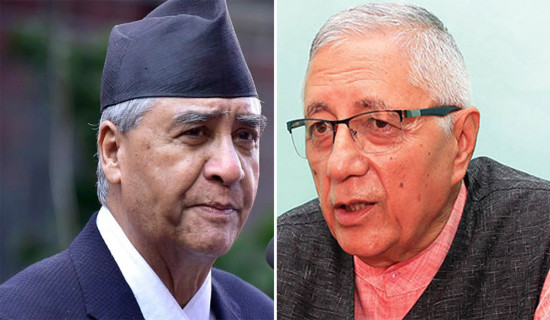- Tuesday, 16 December 2025
Speed Up Fast Track Work
Kathmandu-Tarai/Madhes Fast Track (KTFT) Project, one of the national pride projects underway, has been hailed as the game changer in Nepal's road project. Upon its completion, this expressway will improve road connectivity between Kathmandu and Tarai, reducing travel times by several hours. In the context that the government is planning to build an international airport in Nijgadh, one of the major places in Tarai's Bara district to be connected by it, the project holds much importance.
However, one news revelation on Thursday that the completion date of the project will be pushed farther by several months unless problem of land acquisition is settled immediately warrants serious discussions. The Nepali Army (NA), which is undertaking the project, has said that deadline of the project – mid-April, 2027 – could be missed if the project has to work on preparing and endorsing supplementary environmental impact assessment (SEIA) of the land and forest areas where land pooling and compensation distribution works have not been completed. The awaiting settlement of the land acquisition issue, especially in Khokana and Bungamati areas of Lalitpur, is said to have been contributing to the delay.
For its smooth operation, the project is said to need to acquire 17,651 ropanis of land, of which 5,487 ropanis belong to private individuals. So far, the government has pooled 4,811 ropanis of land. The government still has to pool more than 394 ropanis of land in different parts including the Khokana area, where it has yet to distribute compensation for 206 ropanis. Started on April 25, 2017, the project has achieved 35.38 per cent physical and 36.66 per cent financial progress as of the mid-June, 2024. Initially scheduled for completion by 2021, the deadline was subsequently extended to December 2024 and then to April 2027. As things stand, the deadline is likely to be missed again unless the project takes the required pace. The project had spent Rs. 64.62 billion as of mid-June, 2024 since 2017.
The NA has a proven track record of opening tracks even in difficult terrains, based on which the government assigned it the task of fast track construction. Yet its timely completion has been a challenge. There are repercussions of such delays: cost overruns, failure to reap benefits and setbacks in economic goals, among others. And this is the last thing we want to see happening at a time when the country is graduating to the status of a developing country in 2026. That locals feel deeply attached to their ancestral land and so are opposed to give it away even in exchange for substantial amount of money is understandable. This seems to be the case in land acquisition problem.
That said, examples abound of the cases where seemingly intractable problems have been sorted out amicably. When concerns of the land owners are addressed and they are convinced that the benefits the project will bring far outweighs its downsides, there is reason to believe that they will happily give the land for the project. It's incumbent on the NA to find the ways to achieve this. What's more, legal hurdle is said to be another major problem causing the delay by not allowing to fell trees to pave the way for the road. This is where the government must intervene and enact laws to solve this issue once and for all.
















